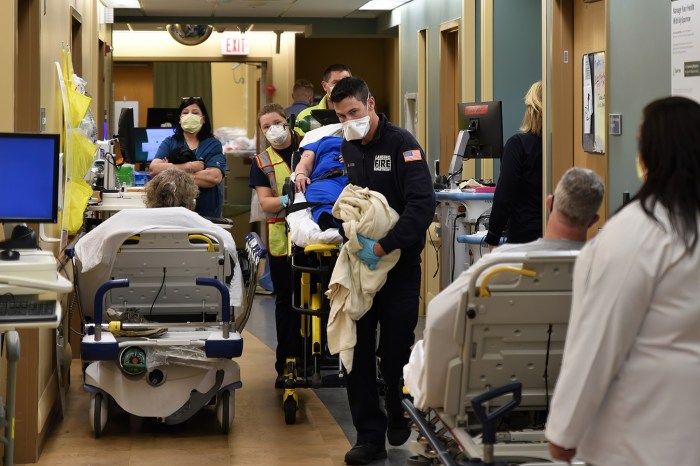Los enfermeros siempre llegan al hospital – Nurses: Always Arriving at the Hospital, this comprehensive analysis delves into the multifaceted role of nurses within the healthcare system, exploring their significance in providing essential medical care, their responsibilities and duties within the hospital setting, and the impact of their actions on patient outcomes.
Their arrival and response times, influenced by factors such as patient acuity, staffing levels, and hospital policies, are crucial in ensuring timely and effective patient care. Effective communication and collaboration among nurses, through various channels, are essential for seamless patient care coordination and improved outcomes.
1. Role of Nurses in Healthcare System

Nurses are essential healthcare professionals who provide comprehensive medical care to patients in various settings, including hospitals, clinics, and community health centers. They play a vital role in promoting health, preventing illness, and assisting with the diagnosis and treatment of diseases.
Responsibilities and Duties of Nurses
Nurses are responsible for a wide range of duties, including:
- Assessing patients’ health status and medical history
- Administering medications and treatments
- Monitoring patients’ vital signs and symptoms
- Providing wound care and other nursing interventions
- Educating patients and their families about health conditions and treatment plans
Specific Tasks and Interventions Performed by Nurses, Los enfermeros siempre llegan al hospital
Nurses perform numerous specific tasks and interventions, such as:
- Inserting and maintaining intravenous (IV) lines
- Performing electrocardiograms (ECGs)
- Assisting with surgeries and other medical procedures
- Providing emotional support and counseling to patients and their families
- Coordinating care with other healthcare professionals
2. Nurses’ Arrival and Response Time

Nurses’ arrival and response times at the hospital are influenced by several factors, including:
Patient Acuity
The severity of a patient’s condition can impact nurses’ response times. Patients with higher acuity levels, such as those experiencing acute emergencies, require immediate attention, leading to shorter response times.
Staffing Levels
The number of nurses available to respond to patient needs can affect their response times. Adequate staffing levels ensure that nurses can provide timely care without excessive workload.
Hospital Policies
Hospital policies can influence nurses’ response times by establishing specific protocols and guidelines for triage and prioritization of patient care.
3. Nurses’ Communication and Collaboration
Effective communication among nurses is crucial for providing high-quality patient care. Nurses use various communication channels, including:
Verbal Communication
Nurses engage in face-to-face conversations and phone calls to exchange information, discuss patient care plans, and coordinate with other healthcare professionals.
Written Communication
Nurses document patient assessments, progress notes, and medication orders in written form to ensure continuity of care and facilitate communication among the healthcare team.
Electronic Health Records (EHRs)
EHRs allow nurses to share patient information securely and efficiently, enhancing communication and collaboration within the nursing team and beyond.
4. Nurses’ Role in Patient Advocacy
Nurses play a pivotal role in advocating for patients’ rights and well-being.
Ethical Considerations
Nurses must adhere to ethical principles and professional standards when advocating for patients. They must respect patient autonomy, confidentiality, and the right to informed consent.
Examples of Patient Advocacy
Nurses advocate for patients by:
- Ensuring patients understand their treatment options and make informed decisions
- Protecting patients from harm or exploitation
- Addressing patient concerns and resolving conflicts
5. Nurses’ Impact on Patient Outcomes: Los Enfermeros Siempre Llegan Al Hospital

Research has consistently demonstrated the positive impact of nurses on patient outcomes.
Evidence Supporting the Impact of Nurses
Studies have shown that nurses’ actions can influence factors such as:
- Patient satisfaction
- Recovery time
- Mortality rates
Strategies to Optimize Nurses’ Contributions
Optimizing nurses’ contributions to improved patient outcomes involves:
- Adequate staffing levels
- Professional development and training
- Empowerment and autonomy in decision-making
FAQs
What factors influence nurses’ arrival times at the hospital?
Factors such as patient acuity, staffing levels, and hospital policies can impact nurses’ arrival times.
How can nurses improve their response times?
Strategies such as optimizing staffing levels, implementing efficient triage systems, and enhancing communication can improve nurses’ response times.
What is the importance of effective communication among nurses?
Effective communication ensures seamless coordination of patient care, reduces errors, and improves patient outcomes.
How do nurses advocate for their patients?
Nurses advocate for their patients by ensuring their rights are respected, providing emotional support, and collaborating with other healthcare professionals.